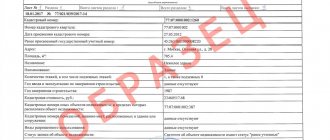The Federal Assessment Standards indicate 3 dates:
- Valuation date – the date as of which the value of the object was determined;
- Inspection date – the date of the actual inspection of the property. If intangible things are assessed (intangible assets, bonds or bills, rights of claim), then an inspection is not carried out and this item is not included in the Report.
- Date of preparation of the report – date of issue and signing of the Report. The validity period of the Report is 6 months, it is calculated from the date of preparation.
Difference between modern and retrospective assessment
The assessment can be carried out as of the current date or as of a date in the past. In the first case, the appraiser goes to the site and records its characteristics for today. Later, when drawing up the Report, he:
- attaches current photographs of the object;
- provides identification data - location address, inventory number, vin number, etc.;
- describes the current state of the object;
- provides a description of the identified defects;
- attaches an inspection report drawn up at the time of visiting the property and certified by the owner.
When determining the current value, it is important that the date of assessment coincides with the date of inspection of the property. Only in this case the result can be considered reliable.
However, you may often find that the inspection is carried out before or after the valuation date. What does this mean?
If the inspection was carried out before the date of assessment, then at the time of the actual work it may no longer physically exist. For example, the appraiser inspected the house on the 10th, and the next day there was a fire that completely destroyed the building. If the appraisal company makes calculations on the 11th, the data will be unreliable - after all, there is nothing to evaluate in fact.
When an inspection is carried out after the date of assessment, the specialist may not take into account any changes made. For example, an appraiser calculated the cost of an apartment on the 10th, and the owner decided to increase its market price by replacing the windows with new ones. The replacement work was carried out on the 11th, the appraiser will come for inspection on the 12th and, accordingly, will no longer take into account the changes made.
A retrospective appraisal is a calculation of the value of an object at a date in the past. In this case, the inspection is carried out on the current date. This type of assessment is carried out for the following purposes:
- Challenging the cadastral value.
- Entry into inheritance rights.
- Litigation.
For example, quite often there are cases when, during the consideration of a case in court, a specific date is fixed. Let's say the date of the transaction between the plaintiff and the defendant. Although the trial may last several years, the assessment date will remain the same.
Disputes regarding the value of real estate are quite common. The plaintiff may claim that the property was sold several years ago at an inadequate price. In this case, a retrospective revaluation of the property will be carried out on the date of the transaction.
Case study: we conducted an assessment in 2010. In 2020, they decided to challenge the transaction carried out with the help of our Report, and the date of assessment in the Report of our opponents remained unchanged - still 2010, although they carried out the assessment 8 years later.
Validity period of the debtor’s property assessment report
Federal Law of December 30, 2008 N 296-FZ Article 130 is stated in a new wording
Article 130. Valuation of the debtor’s property
See comments to Article 130 of this Federal Law
Information about changes:
Federal Law of July 28, 2012
N 144-FZ amendments have been made to paragraph 1 of Article 130, which come into force ninety days after the date of official publication of the said Federal Law and apply to legal relations that arose from the date of completion of the relevant procedure applied in a bankruptcy case, regardless of the date of adoption of the said case to production
1. The arbitration manager engages an appraiser to determine the value of the debtor’s property and pays for his services at the expense of the debtor’s property in cases provided for by this Federal Law.
The valuation of the debtor's property is carried out by an appraiser, who must meet the requirements established by the legislation of the Russian Federation on valuation activities, and cannot be an interested party in relation to the insolvency administrator, the debtor and his creditors.
A meeting of creditors or a committee of creditors has the right to determine a person who, with its consent, is entrusted with the obligation to pay for the specified services of appraisers with subsequent extraordinary compensation for the expenses incurred by him at the expense of the debtor’s property.
The report on the assessment of the debtor's property is subject to inclusion by the arbitration manager in the Unified Federal Register of Bankruptcy Information within two working days from the date of receipt of a copy of this report in electronic form.
Resolution of the Presidium of the Supreme Arbitration Court of the Russian Federation dated July 12, 2005 N 3497/05 In accordance with the current legislation, the presentation and consideration by the court of an independent claim to challenge the reliability of the value of the valuation object contained in the valuation report is possible if the appraiser’s conclusion is mandatory when making transactions. The contested judicial acts are subject to cancellation, since the final value of the market value of the valuation object contained in the report is only a recommended price
Resolution of the Presidium of the Supreme Arbitration Court of the Russian Federation dated July 12, 2005 N 3497/05
The Presidium of the Supreme Arbitration Court of the Russian Federation, consisting of:
presiding officer - Chairman of the Supreme Arbitration Court of the Russian Federation A.A. Ivanov;
members of the Presidium: Arifulina A.A., Vyshnyak N.G., Ivannikova N.P., Isaycheva V.N., Kireeva Yu.A., Kozlova A.S., Kozlova O.A., Moiseeva E.M. , Neshataeva T.N., Pershutova A.G., Strelova I.M., Yukhneya M.F. —
Source: https://cinemafoodfest.ru/srok-dejstviya-otcheta-ob-otsenke-imushhestva-dolzhnika/
Is it possible to conduct an assessment in the future?
It is impossible to evaluate an object at a date in the future. No one can know for sure how the property will improve or deteriorate in a year, two, ten years, etc. In addition, completely unexpected things can happen. For example, a fire or hurricane that destroys the object or most of it.
By the way, at the beginning of 2020, everyone was making “standard” forecasts for the relative current year. No one could predict the appearance of a black swan
— the coronavirus pandemic, which is having a devastating impact on the entire global economy. As of this writing, we are still in crisis. Who can predict when the self-isolation regime will end, when the economy will begin to recover, what growth rates it will have? But this affects the value of all assets.
However, the appraiser can determine the potential profit that the property could generate if used in the future. For this purpose, the income approach is used. It is based on forecasting and using estimated data for the future period. But such a service will be more of a consulting nature.
Documentation
Documents for the company and appraisers are attached to the Valuation Report:
- Insurance policy for the company;
- Diploma of education, Advanced training;
- Certificate of membership in the SRO, Extract from the SRO register;
- Insurance policy for the appraiser.
Mandatory requirements are the relevance of documents as of the date of preparation of the Report: we are talking about both documents of appraisers and documents on the object of assessment. By the way, the date of issue of documents for the assessment object cannot be later than the date of assessment, much less the date of preparation of the Report.
But can the appraiser carry out a retrospective assessment when he may not have had a diploma yet? Yes maybe. For example, an assessment is required for 2012, but a specialist only became a full-fledged appraiser in 2020. In the appraisal industry, as in any other, there is a natural rotation of specialists and their transition to other areas. And for example, a client needs to evaluate shares for 2012 for a notary. Why not?
Falsification.
Some appraisal companies abuse their capabilities and issue false Reports.
For example, when the Report was supposed to be in the court case a year ago, but in fact the document is released today, but retroactively. The report is not in the register on the SRO website and is illegitimate. You can read more about checking appraisers and Reports in the corresponding article on the website.
Let us summarize the above once again: the inspection of the object should be carried out exactly as of the date of assessment. Documents attached to the Report and dated after the valuation date are unacceptable.
Updating the Report
There is a popular service that has recently been used less and less by our clients - updating the assessment report. Most often, banks needed this service. But several years ago, banks switched to independently assessing all collateral. Before this, there was a different practice - the appraisal company had to annually re-evaluate the collateral and issue an updated report to the client.
When updated, the Report template is already ready. So what is the job of an appraiser?
- It is imperative to inspect the object being assessed. In practice, there were cases when the client forgot that changes had occurred at the facility during the year: for example, they purchased additional equipment items or, on the contrary, wrote them off, put into operation an extension to the building, or demarcated the site. Such situations often occur in practice.
- Conduct a market analysis. Right now the market is dead in most sectors. Nothing much changes anywhere. But, changes in external factors may occur: it is planned to build a metro station, or open a new interchange, or the permitted type of use of the site has been changed based on the master plan for the development of the territory.
- Carry out a new calculation. Based on the updated conditions, it is necessary to make a new calculation. Even in a dead market, information changes and is updated.
- Prepare an updated Report. Of course, the report template has already been filled out. But the appraiser also needs to spend time updating all the information.
An example from life.
The client carried out an appraisal of the property in one appraisal company. Now he needed to update the old Report, but he was not satisfied with the price for the work of that company. Addressing us, before we made him an offer, he says - I only need to update the Report, and not make a new one. But we need to make a report from scratch, because we are not yet familiar with this object.
How long is the appraiser's report valid?
Why is an independent assessment needed? How long is the market value assessment report valid? The article talks about how long an apartment appraisal report is valid. The validity period of the immovability assessment and the details of this issue are considered.
How long is a market value report valid?
According to the provisions of 135-FZ, the final amount of the market or other price indicated in the report of independent appraisers is recognized as reliable and recommended for use in the sale and purchase if the parties acted in strict accordance with Russian legislation. Challenging the indicated value is possible in court.
The report prepared by independent appraisers contains a mandatory detail - the date as of which the information provided is current. The “expiration date” of this document as such is not limited by regulations. Only some of the data written in it may become outdated.
According to the provisions of clause 1 of FSO1, the market price stated in the report is valid for six months from the date of drawing up the document or publication of the offer for the sale of a fixed asset or business. The legislation notes that the cadastral value is recognized as an exception to this rule: it does not have a statute of limitations.
Established legal practice shows that courts do not always interpret the expiration of a six-month period as an indicator of irrelevance and unreliability of data. To prove his case in the event of a dispute between the parties, the owner of the fixed asset needs to initiate a judicial procedure for considering the case.
What does the question look like in theory?
The question of how long a report on the assessment of the market value of an apartment is valid is regulated by Federal Law No. 135FZ (latest edition of the year) “On Valuation Activities in the Russian Federation”.
Here is a verbatim excerpt from this law regarding the “expiration date” of the assessment report.
“The final value of the market or other value of the valuation object, determined in the report, with the exception of the cadastral value, is recommended for the purposes of determining the initial price of the subject of an auction or competition, completing a transaction within six months from the date of preparation of the report, with the exception of cases provided for by the legislation of the Russian Federation "
This point is also touched upon in paragraph 26 of the Federal Assessment Standard “General concepts of assessment, approaches to assessment and requirements for assessment (FSO No. 1)” , approved by Order of the Ministry of Economic Development of Russia dated July 20, 2007 No. 256.
“The final value of the valuation object indicated in the valuation report may be considered recommended for the purposes of making a transaction with the valuation objects if no more than 6 months . ”
Why is an independent assessment needed?
There is no legal obligation for organizations planning to sell fixed assets to conduct an independent assessment of their value. However, most companies prefer to incur additional expenses, but have an official document that will serve as protection against claims from the state and counterparties.
When a company has a conclusion about the market value, it has something to answer the questions of the tax authorities. The latter check the transactions and if they find that the cost of the fixed asset is 20% or more lower than the market average, they can hold the company accountable.
Likewise, business valuation can be used to sell the business as a whole. However, there are other reasons for its implementation: the need to obtain information about the competitiveness of a commercial structure, ways to reduce the fiscal burden, possibilities for reorganization, etc.
Calculation of market value
Real estate valuation agreement
Without an agreement, the assessment is considered invalid. It consists of a simple written form; there is no standard form.
The agreement may be concluded on:
- one object;
- several objects;
- long-term cooperation.
It must indicate:
- Who is the customer for the assessment?
- Who is the performer, that is, the appraiser.
- Information about the qualifications and confirmation of the civil liability of the appraiser.
- What exactly needs to be assessed.
- For what purposes do you need to find out the cost (this determines the methods used).
- Type of value determined.
- List of standards for valuation activities.
- The date on which the cost is determined.
- Validity.
- The amount of remuneration (it cannot be expressed in shares or percentages of the cost) and payment procedure.
Real estate appraisal agreement, sample.
Instructions for filling
As a rule, the appraising organization or an independent appraiser has a contract template.
It can be filled out by hand or on a computer.
The following information is entered into the document:
- His number.
- Conclusion date.
- Information about all active parties. This is the full name or name of the organization, the full name of the representatives and the basis on which they act (power of attorney, company charter, minutes of the meeting, etc.).
- Number of copies of the assessment report.
- Information about the appraiser(s): full name, name and location of the self-regulatory organization and information about liability insurance.
- At the end of the agreement, the addresses and bank details of the parties-legal organizations are indicated.
The agreement is signed by the parties or their representatives. An assessment task is also drawn up, which is an appendix to the contract.
Information is entered into it:
- about the object of assessment;
- cost;
- method and procedure of payment;
- timing;
- and other important conditions.
Apartment assessment, sample.
Sample real estate valuation.
Required documents
To sign the contract, the customer will need:
- Passport of the owner - an individual. For a legal entity, you will need a decision (protocol) on the election of a manager (or other confirmation of authority) and his passport.
- Certificate of ownership of real estate.
- Legal documents.
- Various technical documentation.
- If necessary, a power of attorney and passport of the representative.
The document of title is the one on the basis of which the right of ownership arose.
They may be:
- contract of sale;
- privatization;
- deed of gift;
- and others similar depending on the situation.
The required technical documentation depends on the type of property.
The apartment valuation agreement requires:
- Technical plan, which is issued by the BTI.
- Cadastral or technical passport.
- Floor explication.
The terms for appraising an apartment were mentioned above.
For a residential building:
- Cadastral/technical passport.
- A plan of the land plot on which it is located, with designated boundaries.
- Extract from the Unified State Register of Encumbrances.
- Information about engineering networks.
To determine the value of commercial real estate:
- Technical certificate.
- Extract from the Unified State Register.
- Land plan.
- Information about encumbrances.
Attention! You will also need constituent documents and minutes of the meeting with a decision on the appointment of a manager if the owner is an organization.
To evaluate a land plot:
- Cadastral passport.
- Site plan showing exact boundaries.
- Documents that determine the amount of land tax.
If the contract is drawn up for an unfinished construction project:
- Permitting documentation for construction.
- Project with explanations for it.
- Extract from the Unified State Register.
- Information about the structural system and the permitted power consumption of resources.
- Cadastral or technical passport. It must indicate the degree of completion of construction and the built-up area.
- If the building is conserved - an act of conservation.
Important : If the owner is a company, a certificate of book value will be required. It will be prepared by the accounting department.
The appraiser provides documents confirming his qualifications. Further in the article you will find instructions for filling out and what the apartment assessment looks like.
Validity period for real estate assessment
In some cases, it is necessary to determine the market value of a property. An assessment procedure is used for this.
Factors that may affect the value of real estate are considered, and the value is determined based on them.
It is influenced by both the characteristics of the object itself and the environment, market environment, political and economic situation, etc. Since these factors do not remain unchanged, the value of the object changes over time.
The assessment report must indicate the date on which it was made . In many cases, the estimate is used soon after it is determined. Then the expiration date does not matter. You can often hear the question: “How long does an apartment assessment last?”
If the assessment occurs regularly, its result can be considered valid until the next procedure. But more often, a specific date is indicated until which it is valid.
In accordance with the Federal Assessment Standard FSO N 1, the validity period of the assessment cannot be more than six months.
After its completion, the found value is not recommended for use. A judicial authority or a credit institution will most likely not accept it.
Therefore, the assessment will need to be re-evaluated.
Attention! If for some reason doubts arise about the reliability of the assessment, they can be resolved in court.
In such a case, the period that has passed since the assessment is also important.
The validity period of the apartment assessment also does not exceed 6 months.
How it works in practice
If you read the law and the standard carefully, it turns out that although the “expiration date” is indicated, it is indicated only as RECOMMENDED.
In practice, the validity period of the assessment report is most often determined at the discretion of the specialist who requested it from you.
For example, if you need an appraisal for a mortgage (appraisal of an apartment for a mortgage), then it is better to clarify this issue with a bank employee, just in case.
It happens that a bank employee is ready to accept an assessment report “not older than” 1, 2 or 3 months. And there is no way to convince him. After all, the Law “On Valuation” and the valuation standards stipulate the RECOMMENDED shelf life of the report. Recommended is not mandatory, but desirable, that is, it can be neglected if something happens.
Therefore, an employee of a bank or other organization demanding an appraisal report from you can interpret the law and the appraisal standard in his favor and nothing can be done about it.
When and with whom is it concluded?
The customer can only be the owner or his authorized representative.
This could be a company or an individual.
The appraiser can work for a company or independently.
But he must have the appropriate education and be a member of a self-regulatory organization of appraisers.
His qualifications are confirmed:
- diploma of education;
- certificate;
- and an extract from the register of appraisers.
Help : Sometimes there is a third party in the contract - the payer. That is, this is someone who pays for services, but does not own real estate.
This can also be an organization or an individual.
Sources of information used.
- https://raszp.ru/nalogi/srok-deystviya-ocenki-rynochnoy-stoimo.html
- https://otsenka-krasnodar.ru/skolko-dejstvuet-otchet-otsenke/
- https://zhivemvrossii.com/otsenka-nedvizhimosti/srok-dejstvija-po-dogovoru.html
Source: https://finpravo55.ru/skolko-deystvuet-otchet-ocenschika.html
On what date can a business be valued?
The need to evaluate a business arises in various cases, for example, during its sale or reorganization, issuing secured loans, or an issue. The Valuation Report must indicate the valuation date, which is determined by:
- the date of preparation of the last annual financial statements, if no more than 6 months have passed since their preparation;
- date of interim reporting (optional). And if there are no financial statements or significant changes have occurred since their preparation, then it is necessary to request up-to-date data from the company.
Once again, annual financial statements are the most reliable, since they are mandatory and submitted to the Federal Tax Service. All counterparty verification services are based on this data. Due to the fact that a business is a “living organism”, the valuation date should be as close as possible to the date of preparation of the Reports.







